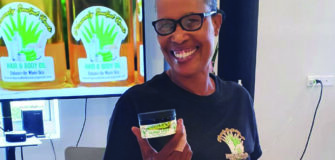Share
With the ever-increasing ageing population in the British Virgin Islands (BVI), elder/geriatric care has become a major talking point. The Minister for Health has expressed his commitment to improving the situation for the elderly in the territory and the Ministry of Health and Social Development has embarked on a project to provide a caring and integrated system of health and social services that facilitates the recovery of human development and quality of life in the BVI. Within the private sector, a few nursing homes have been instituted to help to address the care needs of the elderly.
Polypharmacy, which is the simultaneous use of multiple medications (usually 5 or more) to treat a single condition and or the administration of more medications than necessary, is a very common health issue, especially among the elderly globally.
Research has shown that polypharmacy continues to increase and so poses an increased risk for certain conditions that may cause severe suffering or even death. There is therefore a need for more vigilance among healthcare workers, patients and their relatives concerning the prescribing, dispensing and administration of medications.
While polypharmacy is not limited to the elderly, it is more common in that population as they usually tend to have a higher incidence of multiple chronic diseases (MCC) which include such conditions as arthritis, asthma, diabetes, hypertension, depression and heart disease. According to the literature, among the most commonly used drugs are diabetes, hypertension and cholesterol medicines. This however does not consider the many over-the-counter (OTC) drugs used daily – Tylenol, Paracetamol, vitamins and other supplements; nor does it consider the many “bush remedies” widely used by the local population, especially the elderly.
Medications are given to help and not hurt. However, taking too much can cause harm. Excessive use of medications can increase one’s risk for adverse reactions to the particular drug, cause cognitive impairment, increase the potential for falls, harmful drug interactions as well as drug-disease interactions in which one medication prescribed to treat one condition worsens another or causes a new one. Polypharmacy can also be expensive and very confusing for the patient and family who must try to figure best times to take especially when medications are prescribed by multiple providers, a common practice in the BVI.
The BVI with its many community clinics, private doctor’s offices, hospital outpatient clinic and now easy access to care through membership in the National Health Insurance coupled with the lack of health regulations, and cultural practices provides the perfect opportunity for polypharmacy. Unfortunately, because of the deficiencies in the health care system, this problem, for the most part, goes undetected and therefore unreported. There are little to no available statistics on how many undesirable health outcomes or deaths can be attributed to polypharmacy.
Likewise, many patients engage in what is referred to as doctor shopping. That number has increased sharply since the NHI came on stream. These patients go to several clinics as well as private doctor’s offices with the same complaints. In many instances, they have been prescribed the same drugs or another drug with a similar action. They then go home and take both sets of drugs. Additionally, in keeping with cultural practices they may add some bush medicine to the mix.
Some of these bushes may increase or decrease the actions of some of the prescribed medications leading to an undesirable outcome. However, since no one is monitoring it, it goes undetected. For example, a patient may be prescribed a sedative, he takes the sedative then drinks a cup of soursop bush tea. Soursop bush tea has sedative properties. That action may increase the effect of the prescribed sedative and lead to unconsciousness and even death.
Another issue associated with polypharmacy that can have serious health outcomes is using the generic and brand names of a drug interchangeably, many non-medical persons are not aware that drugs have both a brand name and a generic name and sometimes, especially when using multiple pharmacies, one may use the brand name; the other may use the generic name.
In instances where patients or their caretakers are not aware that the drugs are the same, they usually take both. For example, one of the most widely used pain killers paracetamol or acetaminophen (generic names) has as brand names Panadol/Tylenol. People have been known to take Paracetamol and Panadol at the same time. Taking too much paracetamol (overdose) can lead to liver and kidney damage and death in some instances.
Patients and/or their caretakers can help to reduce the risks associated with polypharmacy by keeping accurate medication records, especially when being treated by multiple doctors, taking their medication records to each doctor visit, using one pharmacy if possible or sharing medication records with each pharmacy and reading medication information inserts carefully. When in doubt, call your doctor or pharmacist. It will also be helpful to document and report any new or unusual reactions after taking your meds.
To effectively address the issue of polypharmacy in the BVI, there needs to be a collaborative approach that addresses the need for more regulations, education and proper assessment of each patient’s medication history during each doctor visit.



